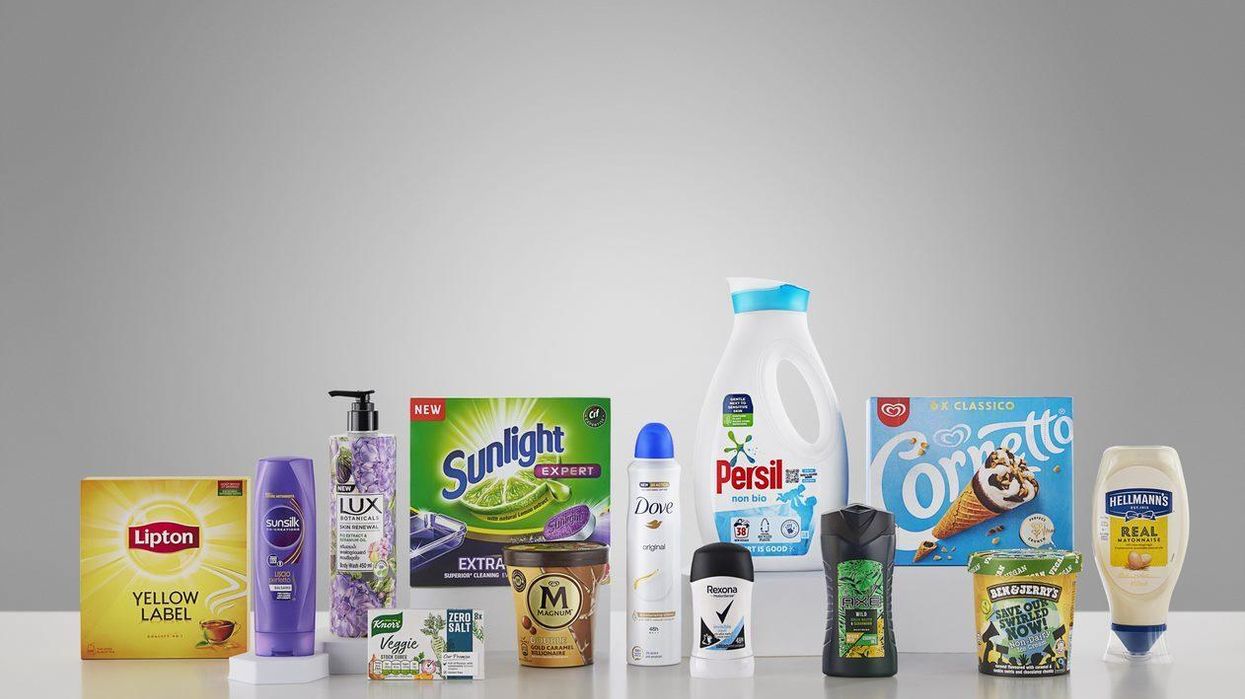Marketing
10 February 2023
Unilever will launch 29 ecommerce hubs to win 'channel of the future'
The DMCs will bring together the CPG's talent in digital marketing, media and sales.

Unilever's billion-euro brands. (Courtesy photo)
The DMCs will bring together the CPG's talent in digital marketing, media and sales.

Unilever's billion-euro brands. (Courtesy photo)
Like all consumer goods companies, Unliever is facing pressure on margins as it continues to see inflation affecting costs. Despite this, the maker of Dove and Ben & Jerry’s is continuing to invest where executives see opportunities to align the organization around digital commerce.
In 2023, this will include a significant move to bring digitally-focused teams together.
The London-based company will open 29 ecommerce hubs around the world. Called DMCs, they will combine digital marketing, media, data and sales teams.
“They're aligned to our five business groups, and those DMCs comprise experts in media, in data-driven marketing, in content excellence and sales capabilities, and they will ensure that we deliver seamless consumer experiences and optimize our investment across all channels,” said CEO Alan Jope. “These DMCs represent a key investment to ensure that Unilever continues to win in this important channel of the future.”
The investment comes as Unilever is seeing continued gains in ecommerce. In 2022, priority digital commerce channels grew 23%, outpacing overall underlying sales growth of 9%. Behavior is also continuing to shift toward digital. While there was a return to stores in 2022, Jope said that many in-person sales started with online searches.
“These channels are going to remain a key source of growth, and we're seeing rapid changes in the landscape as different channels, different models compete for consumers' attention and spend,” Jope said.
Unilever has ramped up marketing spend along with this growth. The London-based company increased marketing by €500 million in 2023, with 80% going directly to media. Marketing spend as a percentage of sales was up in categories including beauty and well-being, personal care and home care, as well. The company plans to once again increase marketing spend in 2023. The DMCs represent a move to ensure the allocation of those dollars is moving at the pace of change in commerce.
As one of the world’s largest consumer goods companies, Unilever has a unique vantage point into how inflation is sweeping around the world
It was among the first major companies to recognize costs going up, even before the invasion of Ukraine. Looking forward in 2023, Jope said the company is not expecting to see a deflationary environment in the second half of the year. However, he allowed that there are “a wide range of potential outcomes.”
In particular, the company is keeping an eye on two key “bellwether” areas for inflation trends. Jope shared the following:
China reopening. After COVID closures, China has $1.5 trillion-2 trillion in excess household savings. That’s leading to a “consumption boom” in China as reopening moves across the country. Travel bookings and cinema occupancy are leading indicators, and Unilever is watching closely to see how that will extend into demand for consumer goods.
Soy crop yields. Commodity pricing is a key driver of inflation. If companies have to pay more for raw materials, that drives manufacturing and supply costs up, which in turn get passed onto the consumer in the form of price increases. Soy crop yields are particularly affected by weather, and have a “knock-on effect” to palm and other crops, Jope said. So they are a leading indicator of supply costs. Unilever is paying close attention to spot pricing and trends so that it can adjust contracts accordingly.
While it monitors conditions for future change, inflation remains a very present concern, and Unilever is continuing to raise prices. In 2022, it raised prices 11.3%, and the fourth quarter increase pushed even higher to 13.3%. This comes with consequences, as the volume of units sold declined by 2.1% for the year. Margins at the company also declined, as Unilever opted not to pass on the full costs wrought by inflation to consumers.
For executives, the task is to balance each of these concerns, while still investing in initiatives such as the ecommerce hubs to spur growth over the long-term.
On the Move has the latest from Amazon, Lovesac and more.
Ryan Cohen is executive chairman of GameStop. (Photo by Flickr user Bill Jerome, used under a Creative Commons) license.
This week, leadership is changing at GameStop, Sorel and Beautycounter. Meanwhile, key executives are departing at Amazon, Wayfair and Lovesac.
Here’s a look at the latest shuffles:
GameStop announced the termination of Matthew Furlong as CEO on Wednesday. A brief statement did not provide a reason for the firing.
With the move, Chewy founder and activist investor Ryan Cohen was named executive chairman of the video game retailer. Cohen will be responsible for capital allocation and overseeing management.
It came as the company reported a 10% year-over-year decline in net sales for the first quarter. Meanwhile, the company’s net loss improved by 62%.
In an SEC filing, GameStop further added this “We believe the combination of these efforts to stabilize and optimize our core business and achieve sustained profitability while also focusing on capital allocation under Mr. Cohen’s leadership will further unlock long-term value creation for our stockholders.”
Cohen was revealed as GameStop's largest shareholder when he disclosed a 10% stake in the retailer in 2020. GameStop went on to become a leading name in the meme stock rise of 2021.
Mark Nenow is stepping down as president of the Sorel brand in order to focus on his health.
After rising to the role in 2015, Nenow spearheaded a transformation of Columbia Sportswear-owned Sorel from a men’s workwear brand to a fashion-focused brand that led with a women’s offering of boots, sandals and sneakers.
“Mark led the brand to sales of $347 million in net sales in 2022,” said Columbia Sportswear CEO Tim Boyle, in a statement. “His leadership has been invaluable to this company, and we wish him the very best.”
Columbia will conduct a search for Nenow’s replacement. Craig Zanon, the company’s SVP of emerging brands, will lead Sorel in the interim.
Beautycounter appointed board member Mindy Mackenzie as interim CEO, succeeding Marc Rey. According to the brand, Rey and the board “mutually decided to transition to a new phase of leadership for Beautycounter.”
McKenzie, a former executive at Carlyle, McKinsey and Jim Beam, will lead the company as it conducts a search for a permanent CEO. Additionally, former Natura & Co CEO Roberto Marques will join Beautycounter’s board as chair.
As part of the transition, Nicole Malozi is also joining the company as chief financial officer. She brings experience from Tatcha, Nike, and DFS Group Limited.
Melissa Nick, a VP of customer fulfillment for North America at Amazon, will leave the company, effective June 16, CNBC reported. Nick joined the company in 2014, and oversaw a region that included nearly 300 fulfillment centers. After doubling its supply chain footprint during the pandemic, Amazon recently reorganized its fulfillment operations to take a regional approach, as opposed to a national model that often resulted in items shipping across the country.

Jon Blotner (Courtesy photo)
Steve Oblak will retire from the role of chief commercial officer at home goods marketplace Wayfair. With the move, Jon Blotner will be promoted to chief commercial officer.
"Steve has served as a critical part of our leadership team and played a pivotal role in Wayfair's growth, helping us grow from a $250 million business when he joined to $12 billion in net revenue today,” said Wayfair CEO Niraj Shah, in a statement. “He oversaw countless milestones, from helping to launch the Wayfair brand as we brought together hundreds of sites into a single platform, to launching new categories, business lines, and geographies while overseeing our North American and European businesses, to leading our debut into physical retail.”
Blotner previously oversaw exclusive and specialty retail brands, as well as digital media at Wayfair. Before joining the company, he served as president of Gemvara.com prior to its 2016 acquisition by Berkshire Hathaway.
Furniture retailer Lovesac said Donna Dellomo will retire as EVP and CFO, and move to an advisory role, effective June 30. Dellomo was with Lovesac for six years.
Keith Siegner was appointed as the next EVP and CFO. He brings experience as CFO of esports company Vindex, as well as executive roles at Yum! Brands, UBS Securities and Credit Suisse.
Additionally, Jack Krause will retire from the role of chief strategy officer, effective June 30. His responsibilities will be divided between CEO Shawn Nelson and president Mary Fox.
“Since joining Lovesac, Jack has played an instrumental role in transforming the Company into a true omni channel retailer by helping expand our physical touchpoints and digital platform as we continue to disrupt the industry,” said Nelson, in a statement.
The National Retail Federation announced the addition of five new board members. They include: